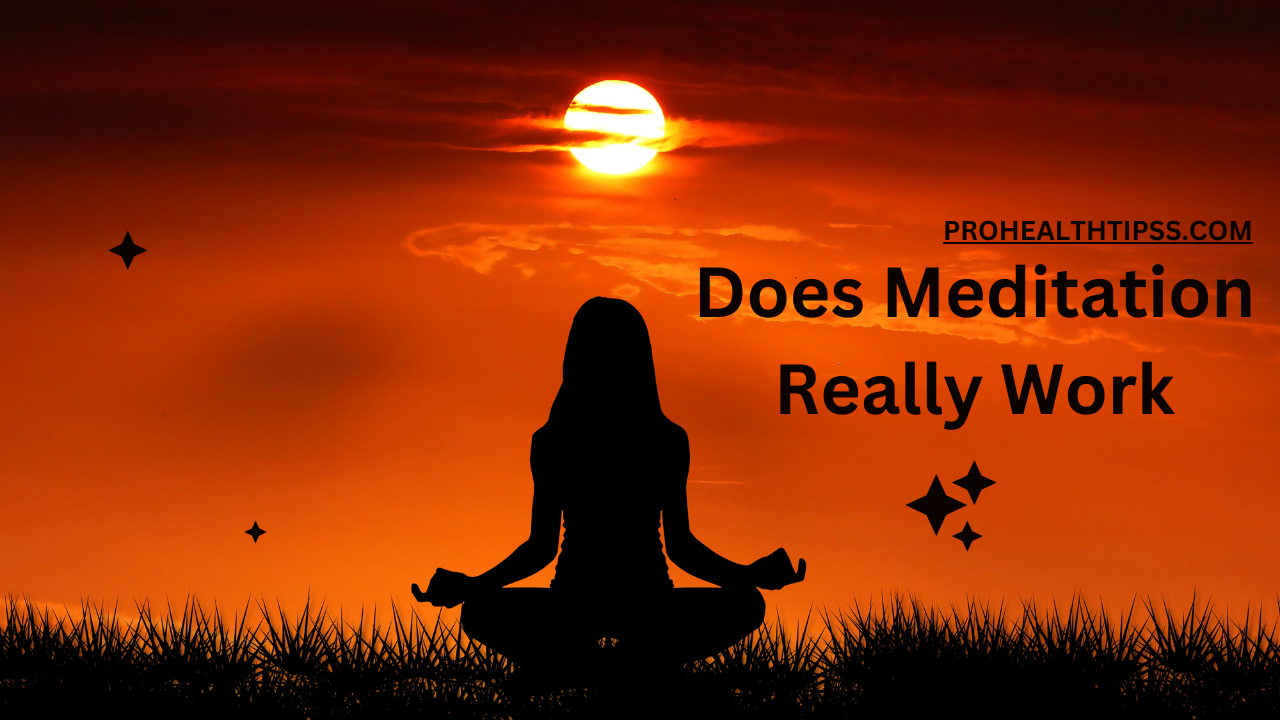Does Meditation Really Work: Benefits of Meditation
The effectiveness of meditation as a means to improve overall well-being and mental clarity has garnered considerable interest and discussion. Numerous research studies have indicated that meditation may bring about tangible advantages, including the reduction of stress, anxiety, and depression, while also enhancing attention and cognitive capabilities. Through training the mind to concentrate and nurture mindfulness, individuals may discover a heightened sense of tranquility and emotional resilience in their daily lives. The true effectiveness of meditation largely relies on an individual’s dedication, consistency, and personal experiences. Like any practice, the key lies in finding an approach that resonates with the individual, as meditation has the potential to be a potent tool for those who embrace and persevere in its practice.

The Proof of Does Meditation Really Work
The question of whether meditation truly works has been a subject of interest and investigation for numerous scholars, scientists, and practitioners alike. Over the years, various studies and research have explored the effects of meditation on mental, emotional, and physical well-being. While the specific outcomes can vary depending on the meditation technique and the individual, a growing body of evidence suggests that meditation indeed yields positive results. Scientific research has shown that regular meditation practice can reduce stress, anxiety, and symptoms of depression, enhance cognitive abilities, promote emotional regulation, and even lead to changes in brain structure and function. However, it is essential to acknowledge that the efficacy of meditation can differ from person to person.
A simple meditation technique that works
Meditating is a simple process – it doesn’t require any magic tricks or hacks. All you need is a quiet place to sit in and concentrate. If you find it challenging to meditate amidst a chaotic day, we suggest a morning meditation upon waking is a calm and peaceful way to start your day before it becomes busy.

Benefits
Here are some of the key benefits of incorporating meditation into your daily life:
- Stress Reduction:
One of the most well-known benefits of meditation is its ability to reduce stress. By encouraging a state of calm and relaxation, meditation helps to lower the production of stress hormones like cortisol.
- Improved Concentration and Focus:
Meditation involves training the mind to maintain focus on a specific object, thought, or breath. As a result, regular practice can enhance your ability to concentrate, stay present, and be more productive in your daily tasks.
- Enhanced Emotional Well-being:
Meditation fosters emotional stability and resilience. By observing our thoughts without judgment and cultivating a sense of inner peace, we become better equipped to handle emotions, leading to a more positive outlook on life.
- Better Sleep:
Those who meditate often experience improved sleep quality. The practice helps relax the mind and body, reducing insomnia and promoting a deeper, more restful sleep.
Also Read This Article Does Meditation Help Anixety and Depression Click Here

Should you Meditate Anyway
Absolutely! Despite any doubts or skepticism you may have, there are several compelling reasons why you should give meditation a try. Meditation has been practiced for thousands of years and has proven to be beneficial for countless individuals. Even if you’re unsure about its effectiveness, the potential benefits of reduced stress, improved focus, emotional well-being, and better overall health make it worth exploring. Meditation offers a unique opportunity to quiet the mind, gain self-awareness, and cultivate a sense of inner peace. So, why not give it a chance? Start with just a few minutes a day, be open-minded, and see for yourself the positive impact it can have on your life.
suggession
Meditation has garnered increasing attention as a potential tool for enhancing mental and emotional well-being. While the scientific evidence supporting its effectiveness is promising, the true power of meditation lies in personal experience. To determine if meditation works for you, consider trying it with an open mind and consistent practice. Start with just a few minutes each day, and gradually increase the duration as you become more comfortable. Explore different meditation techniques to find the one that resonates with you. Remember, meditation is not a quick fix; it requires patience and dedication. With time and commitment, you may discover that meditation indeed brings positive changes to your life, fostering a sense of calm, clarity, and inner peace.

Conclusion
There is substantial evidence supporting the effectiveness of meditation in improving mental and physical well-being. From reducing stress and anxiety to enhancing focus and emotional regulation, meditation offers a plethora of benefits for those who practice it regularly. However, like any skill, meditation requires consistent effort and patience. Finding the right technique and creating a peaceful environment can significantly impact its effectiveness. By embracing meditation as a daily habit and incorporating mindfulness into daily life, individuals can unlock its full potential and experience positive changes in their lives. Ultimately, meditation does work, and its transformative effects can lead to a more balanced and fulfilling existence.
Must Watch Meditation Video



